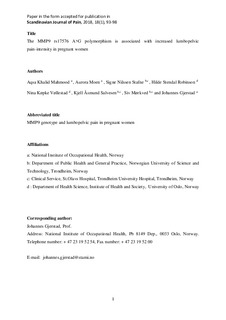| dc.contributor.author | Mahmood, Aqsa | |
| dc.contributor.author | Moen, Aurora Lie | |
| dc.contributor.author | Stafne, Signe Nilssen | |
| dc.contributor.author | Robinson, Hilde Stendal | |
| dc.contributor.author | Vøllestad, Nina Køpke | |
| dc.contributor.author | Salvesen, Kjell Å | |
| dc.contributor.author | Mørkved, Siv | |
| dc.contributor.author | Gjerstad, Johannes | |
| dc.date.accessioned | 2019-01-08T09:06:27Z | |
| dc.date.available | 2019-01-08T09:06:27Z | |
| dc.date.created | 2018-03-16T09:48:08Z | |
| dc.date.issued | 2018 | |
| dc.identifier.citation | Scandinavian Journal of Pain. 2018, 18 (1), 93-98. | nb_NO |
| dc.identifier.issn | 1877-8860 | |
| dc.identifier.uri | http://hdl.handle.net/11250/2579576 | |
| dc.description.abstract | Background and aims:
Matrix metalloproteinase 9 (MMP9) is an enzyme that may affect degradation of several extracellular matrix (ECM) components in the pelvic ligaments during pregnancy. Previous studies indicate that genetic variations in the gene encoding MMP9 may affect the enzymatic activity. One such genetic variant is a single nucleotide polymorphism (SNP), rs17576 A>G. In this study we investigated whether the MMP9 SNP rs17576 A>G may be associated with increased lumbopelvic pain in 838 pregnant woman. The study was registered with ClinicalTrials.gov (NCT 00476567) on May 21, 2007.
Methods:
Lumbopelvic pain-intensity was measured by visual analog scale (VAS) at two time points during pregnancy, T1 (18–22 weeks), T2 (32–36 weeks) and 3 months after delivery. Blood samples were collected at each point and SNP genotyping was carried out using predesigned TaqMan SNP genotyping assays.
Results:
The results showed a significant association between the number of G alleles and pain-intensity in the evening at T2. The pain among G/G carriers was higher than among A/G carriers, which in turn was higher than among the A/A carriers. The most pronounced association between the G allele and pain-intensity was observed in primiparae.
Conclusions:
We conclude that the MMP9 rs17576 A>G polymorphism is associated with increased lumbopelvic pain-intensity during pregnancy. The present data support the hypothesis that lumbopelvic pain during pregnancy may be related to a relaxin – MMP9 – tissue remodeling mechanism. | nb_NO |
| dc.language.iso | eng | nb_NO |
| dc.publisher | De Gryuter | nb_NO |
| dc.title | The MMP9 rs17576 A>G polymorphism is associated with increased lumbopelvic pain-intensity in pregnant women | nb_NO |
| dc.type | Journal article | nb_NO |
| dc.type | Peer reviewed | nb_NO |
| dc.description.version | acceptedVersion | nb_NO |
| dc.source.pagenumber | 93-98 | nb_NO |
| dc.source.volume | 18 | nb_NO |
| dc.source.journal | Scandinavian Journal of Pain | nb_NO |
| dc.source.issue | 1 | nb_NO |
| dc.identifier.doi | 10.1515/sjpain-2017-0168 | |
| dc.identifier.cristin | 1573379 | |
| dc.description.localcode | Locked until 14.2.2019 due to copyright restrictions. This article has been published in a revised form in [https://doi.org/10.1515/sjpain-2017-0168]. This version is free to view and download for private research and study only. Not for re-distribution, re-sale or use in derivative works. ©2018 Scandinavian Association for the Study of Pain. Published by Walter de Gruyter GmbH, Berlin/Boston. All rights reserved. | nb_NO |
| cristin.unitcode | 194,65,20,0 | |
| cristin.unitname | Institutt for samfunnsmedisin og sykepleie | |
| cristin.ispublished | true | |
| cristin.fulltext | postprint | |
| cristin.qualitycode | 1 | |
